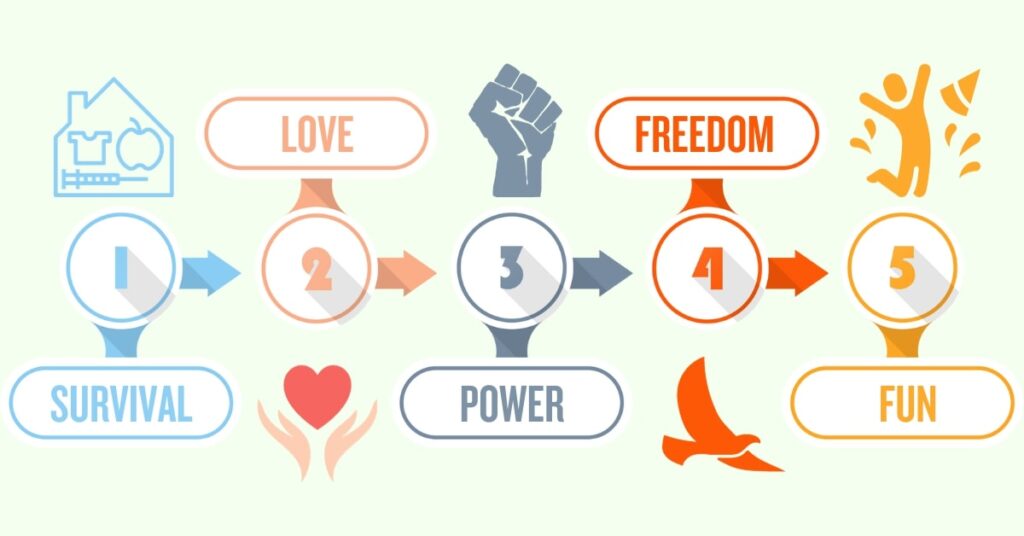William Glasser’s Choice Theory proposes that all human behavior is driven by five basic needs that are hardwired into our genetic code. Unlike Maslow’s hierarchy of needs, Glasser argues that these needs are neither hierarchical nor must be satisfied progressively. Rather, the five needs are universal requirements for human psychological health and happiness.
By understanding these innate needs, we can evaluate our own behavior and create environments that enable people to thrive.
The Five Basic Needs According to Glasser
1. Survival: The Need for Physical Well-being

The need for survival is our most basic human need. It drives us to satisfy the fundamental physiological urges for food, water, shelter, safety, and reproduction. Without meeting survival needs, humans cannot progress toward fulfilling higher psychological needs.
Glasser views the need for survival as an ongoing requirement, not just about bare minimums for existence. He argues that to thrive, we must make choices that create a balance between survival and other needs.
2. Love and Belonging: The Need for Connection and Relationships
The need for love and belonging is crucial for our emotional health. Glasser posits that relationships with friends, family, and community fulfill our desire for companionship and acceptance. These connections give us a sense of identity and support, which are vital for our well-being.
We seek to belong and be loved, leading us to empathize, trust, and care for others. When we achieve healthy relationships, we feel comforted and valued. However, an imbalance can cause loneliness or dependency. Glasser suggests that fulfilling this need involves creating respectful, supportive bonds that enrich our lives.
3. Power: The Need for Significance and Competence

The need for power represents our desire for mastery, achievement, status, recognition, and competence. Glasser argues that all humans require a sense of significance to thrive. We want to feel valued for our skills and contributions. The need for power drives us to gain knowledge, develop talents, and accomplish goals that give our lives meaning and purpose.
Power differs from dominance over others. Rather, it comes from within, from gaining proficiency and earning respect through our efforts and abilities. Satisfying the need for power brings confidence, self-worth, and an internal sense of success. It enables us to have an impact and make a difference in the world.
4. Freedom: The Need for Independence and Autonomy

Freedom refers to our inherent need for choice and autonomy over our lives. According to Glasser, the desire for independence and control of our destiny is fundamental to human motivation. We want the ability to make decisions without excessive external constraints.
The need for freedom drives us to resist rules, structures, or situations that limit our options. It pushes us to take initiative, be resourceful problem-solvers, and gain responsibility. Satisfying the need for freedom brings a sense of empowerment and liberation from oppression. It allows our preferences and creativity to flourish.
However, total freedom without restraint can become chaotic. Therefore, wise choices balance freedom with social responsibility.
5. Fun: The Need for Enjoyment and Learning

Fun is essential to human well-being, as it encapsulates our need for enjoyment, relaxation, and laughter, which Glasser argues is genetically encoded. Playfulness in humans, akin to higher animals, is not just for entertainment but is critical for learning, skill development, and social bonding. Fun activities provide emotional relief, enhance immunity, and build resilience, while also promoting learning and creativity.
Maintaining a balance between fun and responsibility is key to a vibrant life. Failing to allot time for leisure can lead to burnout and depression.
As with all of Glasser’s needs, the ideal approach is to integrate fun into a balanced lifestyle, ensuring that our pursuit of enjoyment complements our responsibilities.
How Glasser’s Basic Needs Influence Human Behavior
Glasser’s theory suggests that our needs drive all human behavior, and our actions represent our best attempt to satisfy them, whether effective or not. This framework helps us understand actions, such as a student’s disruptive behavior for power or an employee’s work avoidance due to a lack of meaning.
While unmet needs can lead to negative behaviors like addiction, satisfying these needs results in self-confidence and compassion. Recognizing that needs shape behavior in every aspect of life, from relationships to lifestyle, allows for greater self-awareness and the pursuit of psychological well-being.
Frequently Asked Questions
How can understanding Glasser’s basic needs improve mental health?
Understanding Glasser’s basic needs can enhance mental health by identifying and addressing unmet needs, which can lead to psychological issues. It promotes self-awareness, personal growth, and empathy, viewing behaviors as needs-driven. This approach can guide therapeutic interventions and focuses on leveraging individual strengths for overall well-being.
How can one fulfill these basic needs according to Glasser?
Fulfilling Glasser’s basic needs involves self-awareness, taking responsibility, and making choices that reflect our needs and values. It includes building healthy relationships, positive lifestyle choices, and striving for personal growth. Daily conscious choices that align with our needs can help achieve happiness and well-being.

